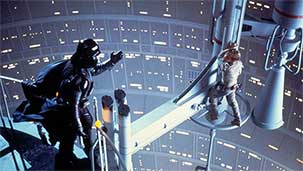Dear Obi-Wannabes,
In the Star Wars universe, it’s called manifest destiny. But on this planet, it’s just lazy storytelling.
Once upon a time, in a theatre far, far away (from this writer, anyway, born in small-town Alberta in 1983), a movie came out that simultaneously thrilled and shocked the world. The Empire Strikes Back is widely considered the high point of the most beloved franchise in movie history, and remains the gold standard against which sequels are measured. So why have so many storytellers taken the exact wrong lesson from a movie filled with countless technical accomplishments and visceral pleasures?
When Darth Vader reveals to Luke Skywalker (shortly after slicing off his hand) that they share the same blood, it’s a barely-foreshadowed brain-buster that seems to make little-to-no sense in the galaxy-spanning story. So incredulous was the claim that, even after wrapping up the trilogy, George Lucas decided he needed another three films just to make sure that the overly convenient plot-twist didn’t go down as the most cosmic coincidence of all-time. Lucas has claimed that the pre-occupation of father and son, and the ways in which we forge our identities through family relations, has been his sole focus from the very start. No need to play in this billion dollar sandbox any longer, thank you very much.
But the idea of making the hero and villain related has become so ubiquitous in recent years, you’d think it’s an official step along The Hero’s Journey. And in fact, much of the blame could no doubt be traced back to Joseph Campbell and The Hero with 1000 Faces, which Lucas drew from in order to build his archetypes and make his space opera relatable. But archetype is just the well-spoken cousin of stereotype, and when a media-saturated world is keeping up with Lucas and the Kardashians, a shortcut to depth is too often forced through family ties.
Take the latest James Bond film, Spectre, as one of the most egregious recent examples (spoiler-waring). To one-up the emotional climax in Skyfall, which is accomplished through a symbolic maternal relationship, the only direction the filmmakers felt they could go was to double-down with daddy issues, shared between Bond and his nemesis. Well, phew. I don’t know about you, but I’m finally ready to enjoy the past 50 years of James Bond knowing every world-threatening event was the evil brainchild of a jilted brother. The series would just be silly otherwise.
Television is just as guilty of committing these sins. Everything from 24 to Alias has been reduced, at some point, to a Thanksgiving-dinner squabble played out with nuclear launch codes. Not to mention all the blockbuster franchises that have relied on a family twist to either shock us, or try to squeeze out renewed sympathy—from The Dark Knight Rises, to Indiana Jones and the Crystal Skull, to A Good Day to Die Hard, etc. Recent North American democracies are dominated by family dynasties, from The Bushes, to The Clintons, and now The Trudeaus. We’ve surrendered the everyman element that makes elections and action adventures relatable. It’s no fun imagining that our heroes are only heroic because of nepotism—we get enough of that in real life.
And in case there are any doubts that this trend links back to the original Star Wars trilogy, look no further than the groan (and barf) -inducing revelation that Princess Leia is actually Luke Skywalker’s twin sister. I may have been born the year Return of the Jedi came out, but I can guarantee that golden bikini buzz-kill plot twist wasn’t to thank. Write this down, everyone. Family stories, good; family twists, bad.
I can (almost) look back and laugh at such an ill-conceived plot point. But it’s not so funny when it’s inspiring so many modern stories. There’s a hell of a lot to learn from those original movies, but family dynamics aren’t one of them.Maybe if Darth Vader had been rejected from art school, the series would have been just as good. Better, actually. He doesn’t need to be Winston Churchill’s dad for me to care.
I hope J.J. Abrams takes note.
Sincerely,

Christopher
Get another take on Star Wars family values.
Check out this DC&C Special Tie-in today.








